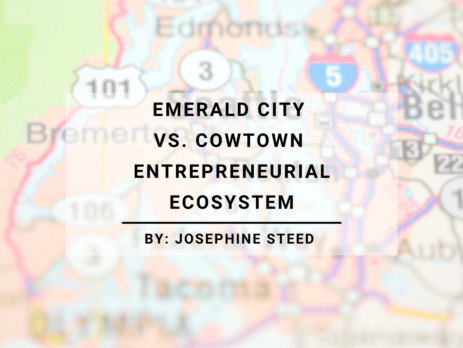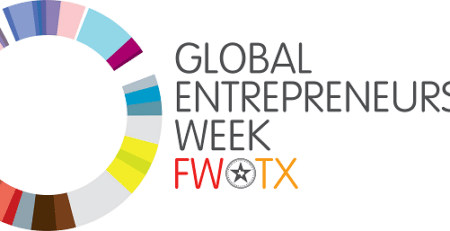From 2015-2020, 16 cities raised over one billion dollars in early-stage capital. Of those cities, nine of them have less than one million people, similar to Fort Worth. Removing the well-established startup cities from the equation, we are left with Seattle, Atlanta, Denver, Oakland, Washington, DC, and Nashville. However, these six cities have an average population of 604,706 (about half the population of Hawaii): roughly 350,000 less than the estimated population of Fort Worth in 2023. If Fort Worth is the 13th most populated US City, why is our entrepreneurial ecosystem not reflecting its size?
Last summer, we analyzed what makes Nashville a great entrepreneurial city, and ultimately the aspects of Music City that Fort Worth can adopt to boost our entrepreneurial ecosystem. Today, let’s delve into what makes Seattle, Washington a startup hub and what the city of Fort Worth can learn from Rain City.
Tech Industry
Seattle dominates Fort Worth in the tech industry, being home to tech giants like Microsoft and Amazon. The Seattle startup ecosystem was worth $109 billion from 2019 to 2021, and the Global Entrepreneurship Network estimates that the tech industry upholds a large portion of that.
Seattle, as a whole, has a culture that encourages innovation, risk-taking, and entrepreneurship. The region has a history of fostering startups from the ground up, and organizations like Techstars Seattle, venture capital firms, and startup incubators support its entrepreneurial ecosystem. And the success stories of companies like Microsoft and Amazon have inspired and motivated many entrepreneurs to pursue their ideas and launch their startups in the area. This culture increases the collaborative nature of the tech industry. Numerous meetups, international conferences, and industry events facilitate professional networking and knowledge sharing.
Fort Worth has a growing technology scene. Bell Flight, an aerospace manufacturer and technology company, and Lockheed Martin’s Aeronautics facility are headquartered there, contributing to the ecosystem’s focus on cybersecurity, aerospace, and defense sectors. Fort Worth also benefits from its proximity to Dallas, which has a more established tech presence. However, the area has significantly fewer tech-focused companies and resources than Seattle.
University Support
Seattle houses a total of 29 colleges and universities, including Washington’s flagship university, the University of Washington Seattle. This provides a vast, young talent pool to fuel the booming workforce. UW Seattle has also been named the 6th most innovative university in the world. This is largely due to their Global Innovation Exchange (GIX), which was created in partnership with China’s Tsinghua University and Microsoft. The program allows teams of students to work in teams to develop a market-ready product to solve real-world problems. This university also has a large international population, coming in at 16.2% of the student body. This helps stimulate international business and improves Seattle’s visibility as an ecosystem worldwide.
Fort Worth houses 13 colleges and universities, giving it a smaller local post-graduate workforce. The most prominent of which is Texas Christian University does not have a global innovation program on the same scale as the Huskies but does boast The TCU Neeley School of Business, which has been ranked sixth in the world for the amount of research published in premier entrepreneurship journals over the last five years.
Investment
Seattle boasts a robust venture capital (VC) community, with numerous VC firms actively investing in local startups. Washington saw $8.5 billion invested in 549 venture capital deals in 2021, most of which occurred in Seattle. Seattle also saw $3.9 billion in early-stage funding from 2019-2021, compared to the global average of $970 million. The presence of tech giants and a history of successful startups have helped stimulate a favorable investment climate. Additionally, there are many angel investor networks and accelerators and much access to government funding programs.
Fort Worth has a less extensive investment landscape than Seattle, but there are initiatives to support entrepreneurs and attract investment. The city has angel investor networks, venture capital firms, and economic development organizations that offer funding opportunities and support for startups, but on a different level than Seattle.
Startup Resources
Seattle has more than 20 notable incubators and accelerators and many networks and organizations to support startups. It also hosts over five big conferences, like Seattle Startup Week, a year and countless events, like NewTech Seattle, to help inspire and aid small businesses.
Fort Worth has fewer options for resources and a less established network of entrepreneurial organizations. However, if the city dedicates itself to creating those connections and building resources, it could flourish into a similar ecosystem.
Tourism
Seattle consistently ranks highly in domestic and international tourism rankings. Seattle saw 33.9 million total visitors, 18 million of whom were overnight visitors in 2022. This was a 27.4% increase overall and a 34.9% increase in overnight visitors from 2021, indicating that the city is leaping out of post-pandemic conditions and thriving on loosened travel regulations. The tourism industry also saw a 12.6% increase in jobs from 2021, totaling 61,978 jobs for the year. The city’s focus on tourism is supported by its abundance of live music, nine pro sports teams, proximity to national parks, over 40 museums, water access, and more. Iconic landmarks like the Space Needle, Pike Place Market, and the Museum of Pop Culture have contributed to visitors spending a collective $7.4 billion during their stays. This constant influx of travelers and business opportunities keeps Seattle up-to-date and busy.
Fort Worth does not stack up against these numbers. Cowtown hosted 10.8 million visitors, $3 billion in the economic impact of tourism, and supported 30,000 tourism jobs in 2021. However, the city has many attractions that make travel worthwhile and represents a more competitive number when the DFW metroplex is measured as a unit.
Livability
Regarding which city is better for entrepreneurs to live in, it comes down to preference and priorities.
The climates of the two cities are vastly different. Fort Worth is known for its scorching hot summers and cool, unextreme winters. Seattle is known for its seemingly sunless rainy season from October to March but boasts verdant, temperate summers that locals are adamant make it worth living in the seasonal gloom.
The size difference between the cities is also an important factor for businesses. Seattle has a smaller population by approximately 200,000 residents, but Fort Worth’s population is significantly less dense, given that its geographic size is 272 square miles larger than that of Seattle. However, these differences do not impact commuting significantly. According to the US Census Bureau, Seattle and Fort Worth have very similar mean travel times to work, coming in at 27.7 minutes compared to 27.1 minutes, respectively.
Both Fort Worth and Seattle are brimming with culture and history. While Seattle may smell more like coffee than teen spirit these days, that doesn’t mean it isn’t still a hub for music and pop culture. Seattle has numerous unique venues and an impressive history of giving bands and artists such as Jimi Hendrix, Nirvana, Macklemore, and many more a launchpad to become global sensations. Fort Worth may not have a reputation for producing musicians like Seattle, but it has recently become a frequent stop for some of the most popular artists in all genres since the state-of-the-art Dickies Arena opened in 2019. And the Fort Worth Stockyards is a Texas bucket list staple for many travelers.
Exceptions
The Emerald City is surely the gold standard for entrepreneurial ecosystems. However, Cowtown has a few notable assets that give it an edge. The DFW international airport is the nation’s second most global airport in the nation, beating out Seattle-Tacoma international airport, which is ranked 4th. This could largely be attributed to American Airlines’ headquarters in Fort Worth.
Additionally, the cost of living in Fort Worth is 57.62% lower than that of Seattle. This is extremely convenient for startups and entrepreneurs in the early phases of building a business and creates a conducive environment for new business ventures.
Takeaways
- Fort Worth’s tech industry cannot match Seattle’s. However, nurturing existing startups and mature businesses in the defense and aerospace sectors would encourage growth in the globally expanding field of tech and draw more entrepreneurs.
- Increasing the appeal and prominence of college and university presence, especially for business and entrepreneurship, could invigorate the workforce and increase the number of startups.
- Continuing to pursue expansion of investment could help produce startup success stories that positively impact the likelihood of increasing investors.
- Establishing more entrepreneurial programs, especially those that serve minorities and underserved populations, would make Fort Worth a more attractive small business destination.
- Fort Worth can’t adopt the coastal, Northwestern atmosphere, but it can continue to enrich its Southwestern charm by improving marketing and tourism.
- Both cities are highly livable, but their vibes are entirely different. Entrepreneurs must choose what matters most to them regarding the living environment.
Cowtown and Emerald City both have unique cultures and approaches to business. However, if Fort Worth took on a few of Seattle’s strategies and put a Funkytown spin on it, it could bolster the entrepreneurial ecosystem in huge ways and improve the startup community.

Josephine Steed is a student intern for the Next department at the University of North Texas Health Science Center at Fort Worth. Josephine will be a second-year student at the University of South Carolina, pursuing a BBA in both Public Health and Psychology. Go Gamecocks! All thoughts and opinions are her own and in no way reflect the thoughts and opinions of HSC.



